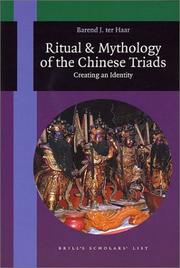| Listing 1 - 7 of 7 |
Sort by
|
Book
ISBN: 1442659572 1442628162 Year: 2000 Publisher: Toronto [Ontario] ; Buffalo [New York] : Ottawa, Ontario : University of Toronto Press, Canadian Electronic Library,
Abstract | Keywords | Export | Availability | Bookmark
 Loading...
Loading...Choose an application
- Reference Manager
- EndNote
- RefWorks (Direct export to RefWorks)
The image of the outlaw biker is widely recognize in North American society. The reality is only known to insiders. To study the phenomenon of outlaw biker clubs, anthropologist Daniel Wolf bridged the gap between image and reality by becoming an insider. Electronic Format Disclaimer: Preliminary images removed at the request of the rights holder.
Motorcycle gangs --- Subculture. --- Deviant behavior. --- Rebels Motorcycle Club. --- Canada. --- Alberta.

ISBN: 0325002185 0325002193 0852556403 085255690X Year: 2000 Publisher: Cape Town Oxford Portsmouth David Philip James Currey Heinemann
Abstract | Keywords | Export | Availability | Bookmark
 Loading...
Loading...Choose an application
- Reference Manager
- EndNote
- RefWorks (Direct export to RefWorks)
Gangs --- Juvenile delinquency --- Youth --- Soweto (South Africa) --- Social conditions.

ISBN: 9004119442 9004483047 Year: 2000 Publisher: Leiden ; Boston : Brill,
Abstract | Keywords | Export | Availability | Bookmark
 Loading...
Loading...Choose an application
- Reference Manager
- EndNote
- RefWorks (Direct export to RefWorks)
Triads (Gangs) --- Triade (Sociétés secrètes) --- Hong men (Society)

ISBN: 1134696825 1280330821 0203030001 0203171705 9780203171707 9780203030004 9780415170925 0415170923 0203175255 9780203175255 9786610330829 6610330824 9781134696772 9781134696819 9781134696826 9780415757249 0415360013 1134696817 Year: 2000 Publisher: London New York Routledge
Abstract | Keywords | Export | Availability | Bookmark
 Loading...
Loading...Choose an application
- Reference Manager
- EndNote
- RefWorks (Direct export to RefWorks)
There is no doubt that the triads have become recognized as a sophisticated and international criminal force and, following the handover of Hong Kong to China, there have been increasing fears that their influence will spread to the West through emigration. This book investigates the reality behind the myth with a study of the Hong Kong triads, generally regarded as the headquarters of triad societies throughout the world. Yiu Kong Chu examines their origins, their organized extortion from legitimate businesses large and small, and their more recent moves into illegal activities such as drug t
Triads (Organized crime) --- Secret societies --- Triad societies --- Organized crime --- Fraternities --- Hazing --- Rites and ceremonies --- Ritual --- Societies --- Sociology --- Initiations (into trades, societies, etc.) --- Triads (Gangs)

ISBN: 0415170923 Year: 2000 Publisher: London Routledge and Kegan Paul
Abstract | Keywords | Export | Availability | Bookmark
 Loading...
Loading...Choose an application
- Reference Manager
- EndNote
- RefWorks (Direct export to RefWorks)
S11/0810 --- S27/0800 --- S27/0755 --- Secret societies --- -Triads (Organized crime) --- Triads (Organized crime) --- Triad societies --- Organized crime --- Fraternities --- Hazing --- Rites and ceremonies --- Ritual --- Societies --- Sociology --- Initiations (into trades, societies, etc.) --- China: Social sciences--Secret societies, triads --- Hong Kong--Society in general --- Hong Kong--Economic relations with mainland China --- Triads (Gangs) --- Triads (Gangs).

ISBN: 9780195136272 019510238X 0195136276 Year: 2000 Publisher: New York Oxford university
Abstract | Keywords | Export | Availability | Bookmark
 Loading...
Loading...Choose an application
- Reference Manager
- EndNote
- RefWorks (Direct export to RefWorks)
Chinese American criminals --- Chinese American gangs --- Chinese American teenagers --- Extortion --- 858 Geweld --- Blackmail --- Chantage --- Offenses against property --- Undue influence --- Threats --- Teenagers, Chinese American --- Teenagers --- Gangs, Chinese American --- Gangs --- Criminals, Chinese American --- Criminals --- Chinatown (New York, N.Y.) --- Hua bu (New York, N.Y.) --- Tang ren bu (New York, N.Y.) --- 紐約華埠 (New York, N.Y.) --- 纽约华埠 (New York, N.Y.) --- Niuyue hua bu (New York, N.Y.) --- 華埠 (New York, N.Y.) --- 华埠 (New York, N.Y.) --- Social life and customs. --- S11/0800 --- S11/0810 --- S11/1120 --- China: Social sciences--Associations, guilds --- China: Social sciences--Secret societies, triads --- China: Social sciences--Migration and emigration: U.S.A. and Canada (incl. Hawaï) (whatever timeperiod) --- 883.2 Oost-Azië
Book
ISBN: 0691225362 Year: 2000 Publisher: Princeton, New Jersey : Princeton University Press,
Abstract | Keywords | Export | Availability | Bookmark
 Loading...
Loading...Choose an application
- Reference Manager
- EndNote
- RefWorks (Direct export to RefWorks)
Here, for the first time, two of Russia's leading economists provide an authoritative analysis of the transition to a democratic market economy that has taken place in Russia since 1990. Serguey Braguinsky, a Russian economist with extensive international experience, and Grigory Yavlinsky, leader of the liberal "Yabloko" party and a major public figure in Russia, focus on the institutions that are critical to a successful transition and the economic incentives needed to make these institutions work. Finally, they discuss in detail the specific components of the economic processes that are necessary for economic transition in general and they draw lessons that can be applied to other nations dealing with similar transitions. In 1989, Grigory Yavlinsky became a member of the Commission for Economic Reform and wrote the groundbreaking "500 Day Plan," which outlined the first program of transition to a market economy. Two years later, he co-wrote the program of strategic cooperation between the Soviet government and the West (known as the "Grand Bargain"). Here he and Serguey Braguinsky examine what went wrong with the Russian plan--and what is needed to put the economy back on the road to becoming a fully functioning market economy. The first section of the book presents a new interpretation of the political economy of the socialist state and the incentives and institutions that underpin it, with an emphasis on the present Russian situation. The second part deals with the political economy of "spontaneous transition" and the inefficiencies inherent in economies that lack the organizations and institutions that inhere in established Western democratic economies. In the final section, the authors present a program of actions to put the economic transition in Russia back on track, based on their assessment of the actual current state of both the economy and the government. Their approach is unique in emphasizing organizational evolution at the microeconomic level instead of stressing macroeconomic issues such as money and inflation that are at the heart of most arguments. This is a thoughtful and thought-provoking book and one that will be widely discussed and debated.
Privatization --- Economic stabilization --- Russia (Federation) --- Economic conditions --- Andropov, Yuri. --- Arrow, Kenneth. --- Baumol, William. --- Belyanova, Yelena. --- Berliner, Joseph A. --- Binmore, Ken. --- Brezhnev, Leonid. --- Camdessus, Michel. --- Chernenko, Konstantin. --- Cheung, Steven. --- Chubais, Anatoly. --- Coase, Ronald. --- Demsetz, Harold. --- Dixit, Avinash. --- Fischer, Stanley. --- Hewett, A. --- Khrushchev, Nikita. --- Kosygin, Alexei. --- Lenin, V. I. --- North, Douglass. --- Olson, Mancur. --- Pindyck, Robert. --- Popper, Karl. --- Schumpeter, Joseph. --- State Insurance Fund (SIF), proposed. --- Stigler, George J. --- Vishny, Robert. --- Washington consensus packages. --- Yabloko movement. --- Zakaria, Fareed. --- authority: value of (Arrow). --- economic development: promotion in Russia. --- energy sector: implementation of PSA law in. --- evolutionary stable strategy: concept in game theory. --- financial markets. --- gangs: organized labor as force opposing. --- human capital: squandering in Russia of. --- incentives under. --- incentives: high- and low-powered. --- industrial associations (VPOs). --- investment: factors limiting. --- labor force: employment in rent-seeking firms. --- lobbying: of industrial associations. --- mafia: preferences in parallel economy. --- media: controlled by oligarchs. --- mining sector: production levels (1990s). --- outsiders: employees in PSOEs as. --- ownership: of assets under planned economy. --- police state: in planned economy. --- privatization: of collective property. --- propiska. --- rent seeking: incentives for. --- social nihilism.
| Listing 1 - 7 of 7 |
Sort by
|

 Search
Search Feedback
Feedback About
About Help
Help News
News